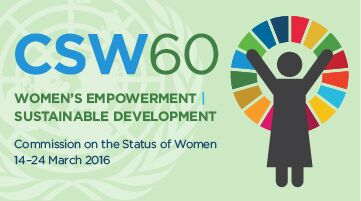From skepticism to hope: the 60th Commission on Status of Women
 I don’t trust the government. Though when I was a child, I idolized the leaders and I wanted to serve the Philippine state. But this high regard ceased as I grow older. My admiration is slowly being ripped apart, as the realities of corruption, exploitation, violence against women, rape and sexual abuses, etc. are being revealed to me. The beautiful picturesque of the government and state that I once loved, is stained with blood from the extra judicial killings it perpetuated to its own people. My confidence that the government is there to protect me as a young woman, was doomed by several instances that it failed to do so. I feel that the Philippine government is not reliable in providing safe space for women and girls. I feel there is no authority, whom I can depend on.
I don’t trust the government. Though when I was a child, I idolized the leaders and I wanted to serve the Philippine state. But this high regard ceased as I grow older. My admiration is slowly being ripped apart, as the realities of corruption, exploitation, violence against women, rape and sexual abuses, etc. are being revealed to me. The beautiful picturesque of the government and state that I once loved, is stained with blood from the extra judicial killings it perpetuated to its own people. My confidence that the government is there to protect me as a young woman, was doomed by several instances that it failed to do so. I feel that the Philippine government is not reliable in providing safe space for women and girls. I feel there is no authority, whom I can depend on.
But, last March 2016, I had to reconsider these feelings. I was given an opportunity to engage with the governments at the United Nations 60th Commission on Status of Women, the principal global intergovernmental body exclusively dedicated to the promotion of gender equality and the empowerment of women and girls. This year, the UN Member States explored the links between women’s empowerment and Sustainable Development Goals (SGDs). The gaps in implementation of 1995 Beijing Declaration and Platform of Action were also discussed.
With support from IWHC, ASAP, and PINSAN, I went to the UN Headquarters and enagaged in advocacy to make the governments accountable to the commitments they have made to guarantee gender equality, eliminate all forms of discrimination and violence against women, and achieve the full realisation of all of our human rights. Though full of doubts and hesitations, whether this would really make a difference in my country; yet, I gave it a try.
I met feminists and advocates from all over the world with one mission: to ensure progress with the commitments the governments had made, and to make concrete steps towards achieving global targets on gender equality. It was a gathering of women of different identities, ages, race and religion, making the governments aware that women are here and we are watching. Everyone was brave and the spirit was contagious.
60th CSW Outcome
Though, there are major accomplishments such as on the issue of migration and climate change; but some previous commitments were rolled back. The influence of the conservative countries, such as the Holy See, Nigeria, Egypt, India, Russia, Pakistan and the Gulf States were dominant on some issues discussed. For example, they agreed on reproductive rights, but blocked commitments on the right to sexual orientation and gender identity and sexual rights. Further, there is no language about abortion, and it was not even talked about.
They also negotiated the HIV resolution and recognized the need for gender-responsive approach to combating HIV epidemic. They acknowledge that it disproportionately affects women and girls. However, they didn’t recognize comprehensive sexuality education, as an effective prevention method in lowering the risk of HIV among women and girls.
Hence, the advocates were so dismayed about the outcome of the 60th CSW. They said the governments failed to make concrete commitments to fully support the promises of the SDG 2030 Agenda for women and girls.
Never too late
Though, I feel a bit upset about it, but, there still exists some hope with a global solidarity of women, working to make the world a safe place for everyone. CSW is a women’s space, and women’s movements are claiming that space. We have champions and sisters working in different areas. Some are engaged in global policy-making and struggling hard to translate it at the national level. Others are working at the grassroots. Some are veterans, who’ve been in the struggle even before when I was born. Others are newcomers, young feminists like me.
I feel that at this moment, women, young people and the rest of the Filipinos have their own responsibilities to embrace, for this cause. The Philippine national elections is a good opportunity to make decisions for the country that would matter, not only at the local level. The global policies can be meaningful only when our national leaders commit to gender equality and full realization of human rights. We need leaders who commit to eliminate of all forms of discrimination and violence against women, and ensure to make the country a safe space for women and girls. This is the time to make our voices count. ###






